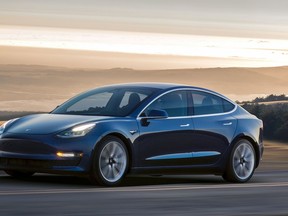New Car Dealers Association says wait-times for electric vehicles should start to fall in 2023

Long wait lists, a change in B.C.’s electric car rebate policy and an increase in the price of some versions of the popular Tesla Model 3 have led to a drop in electric-vehicle rebates claimed over the past year, according to the New Car Dealers Association of B.C.
This comes as both the federal and provincial governments have moved up their timelines to have 100 per cent of new cars sold be zero emission by 2035.
Start your day with a roundup of B.C.-focused news and opinion delivered straight to your inbox at 7 a.m., Monday to Friday.
Thanks for signing up!
A welcome email is on its way. If you don't see it, please check your junk folder.
The next issue of Sunrise presented by Vancouver Sun will soon be in your inbox.
According to data provided by the New Car Dealers Association of B.C., there were 9,693 EV units sold in the province in 2022 for which the owner successfully applied for a provincial rebate.
This was around half the 18,533 EV rebates issued by the provincial government in 2021. In 2020 there were 8,622 rebates issued.
New Car Dealers Association of B.C. president Blair Qualey said the drop was likely due to supply problems left over from the COVID-19 pandemic that are leading to long wait lists for EVs, plus the B.C. government’s decision last summer to means test EV rebates.
Before August, 2022, anyone was eligible for a $4,000 electric car rebate in B.C. as long as the vehicles was worth $55,000 or less.
However, now anyone earning more than $100,000 is not eligible to apply for a rebate. Under the new regime if you earn less than $80,000 you can get a $4,000 rebate, $2,000 if you earn between $80,000 and $90,000 and $1,000 if you earn between $90,000 and $100,000.
The $5,000 federal rebate is not means tested and applies to EV cars worth less than $55,000 and EV SUVs and trucks worth less than $60,000.
Ekta Bibra, senior policy adviser with the Simon Fraser University based Clean Energy Canada, said that part way through 2022 the price for some versions of the Tesla Model 3 (the most popular electric vehicle in B.C.) were bumped up and outside eligibility for a federal or provincial rebate.
Qualey said that his industry sources and experts were telling him that supply chain problems should diminish in 2023, noting sales of all passenger vehicles were down in 2022 compared to the year before.
“Everyone I’m talking to says it’s improving,” said Qualey, adding all passenger vehicle sales were down in B.C. in 2022.
In 2022 the most popular EV car sold in B.C. was the Tesla Model 3, followed by the Chevrolet Bolt, Hyundai Kona, Hyundai Ioniq 5 and Mini Cooper.
In 2021 it was the Tesla Model 3, Hyundai Kona, Prius Prime, Tesla Model Y and the Toyota RAV4 Prime (with the Model 3 accounting for 43 per cent of all sales).
According to the B.C. government’s Clean B.C. program, in 2021 electric passenger vehicles comprised 13 per cent of all passenger vehicles sold, compared to 9.4 per cent in 2020 and 8.7 per cent in 2019.


